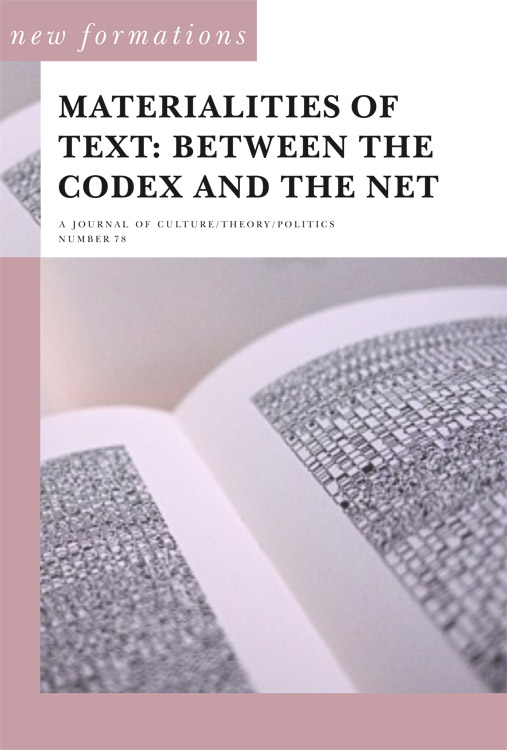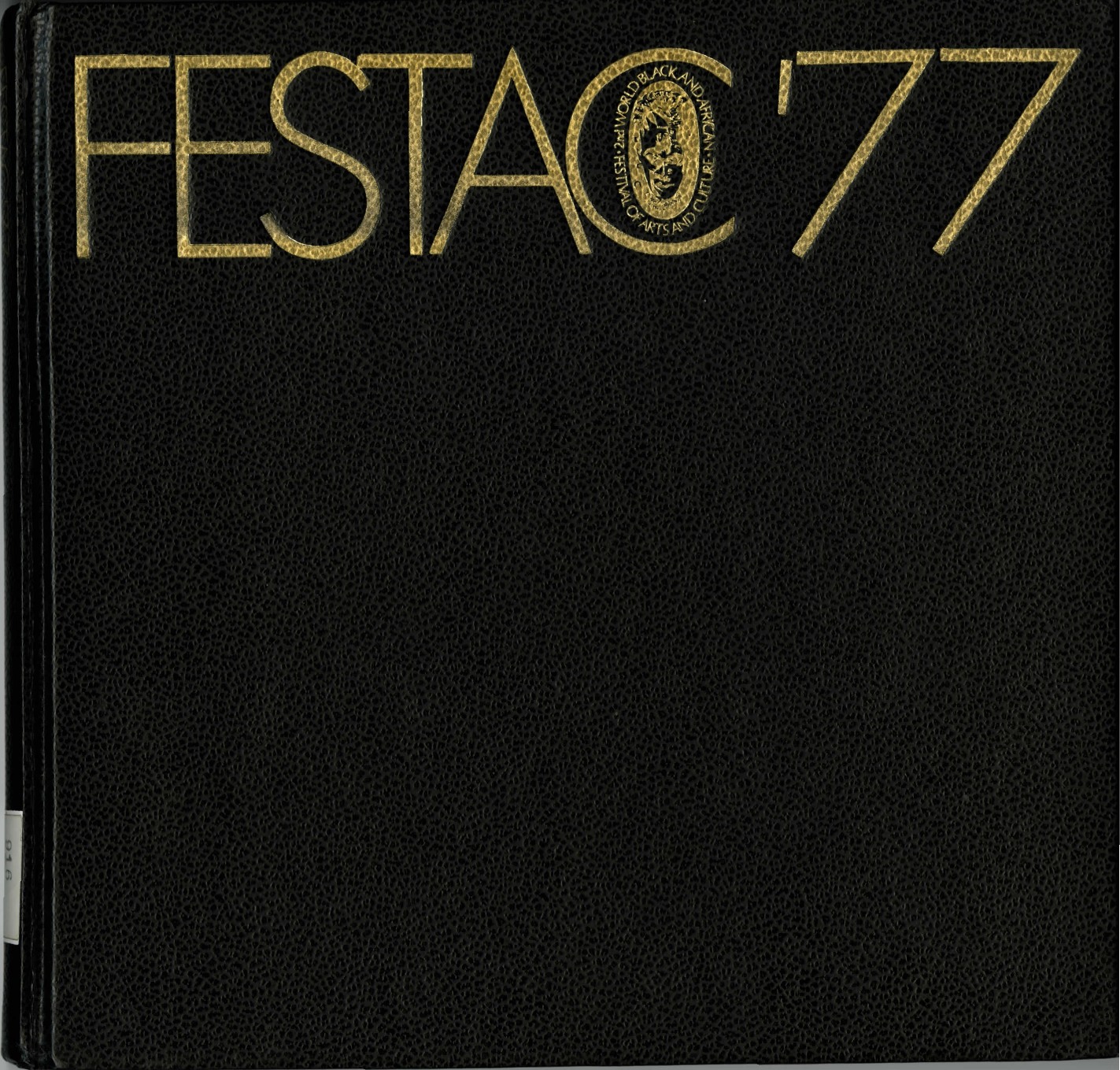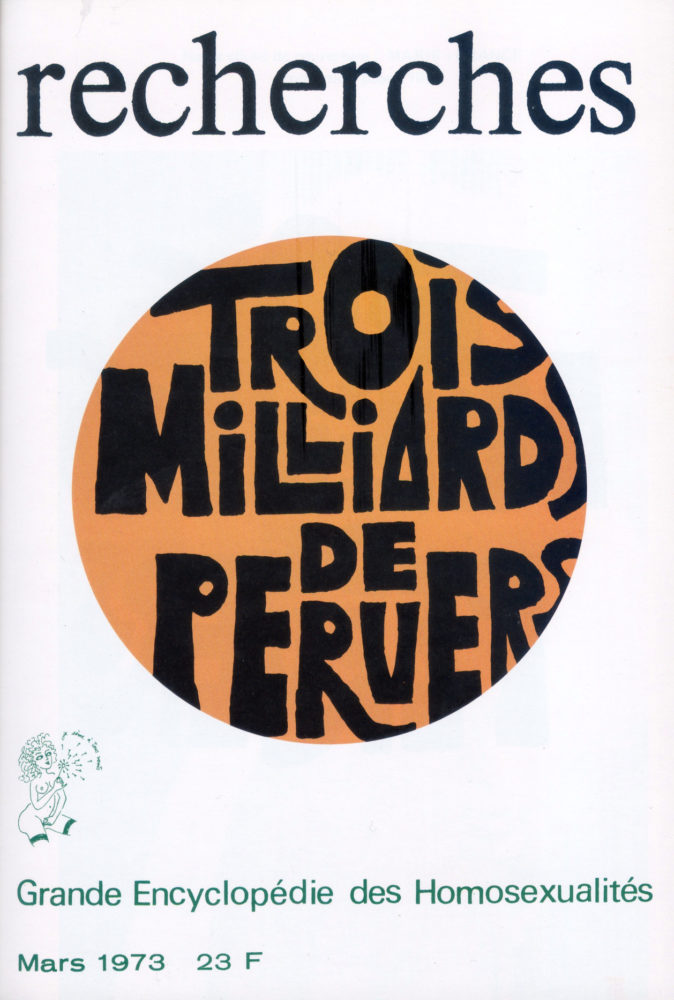New Formations, 78: Materialities of Text: Between the Codex and the Net (2013)
Filed under journal | Tags: · archive, artists book, book, digital humanities, digital library, library, materiality, publishing, reading, shadow library, text

“The cultural authority of the codex form of the book appears to be in a process of displacement ensuing from the rise of on-line digital media. The traditional material structures of the book – its physical forms and its institutional forms of production, circulation, and preservation – are often seen as being subject to dematerialisation; evaporating in the transitory appearances of the digital screen and in the proliferation of new systems of production. However, this issue of New Formations makes the case that the present historical juncture should be understood as a mixed media milieu, in which traditional and digital forms of writing and publishing coalesce and conflict in a complex array of textual materialities.
Such materialities of text are at once sites of political and aesthetic experimentation, and of intense capitalization, intersecting features which are approached in the articles collected here through a broad range of theoretical and empirical themes: diagrammatic writing; the material reading formations of a best-seller novel; grey literature in the institutions of cultural studies; Black Twitter; the politics of Open Access and the artists’ book; digital humanities and its political problematics; the bibliopolitics of the passport; and the political and aesthetic forms of independent publishing.”
Contributions by Richard Burt, Sanjay Sharma, Hanna Kuusela, Johanna Drucker, Ted Striphas and Mark Hayward, Sas Mays, Janneke Adema and Gary Hall, Jodi Dean, Sean Dockray, Alessandro Ludovico, Pauline van Mourik, Broekman, Nicholas Thoburn and Dmitry Vilensky.
Edited and with an Introduction by Sas Mays and Nicholas Thoburn
Publisher Lawrence & Wishart, Summer 2013
ISSN 0950-2378
207 pages
Review: Janneke Adema (2013).
Comment (0)FESTAC ’77 (1977)
Filed under book | Tags: · africa, art, black people, caribbean, diaspora, film, literature, music, négritude, pan-africanism, poetry

“Festac ’77, also known as the Second World Black and African Festival of Arts and Culture (the first was in Dakar, 1966), was a major international festival held in Lagos, Nigeria, from 15 January 1977 to 12 February 1977. The month-long event celebrated African culture and showcased to the world African music, fine art, literature, drama, dance and religion. About 16,000 participants, representing 56 African nations and countries of the African Diaspora, performed at the event.
Artists who performed at the festival included Stevie Wonder from United States, Gilberto Gil from Brazil, Bembeya Jazz National from Guinea, Mighty Sparrow from Trinidad and Tobago, Les Ballets Africains, South African Miriam Makeba, and Franco Luambo Makiadi. At the time it was held, it was the largest pan-African gathering to ever take place.” (Wikipedia)
Publisher Africa Journal Limited, London, and International Festival Committee, Lagos, 1977
152 pages
via Abdul Alkalimat
Film documentary (UNESCO, 1977, 26 MB)
Commentary: Arthur Monroe (Black Scholar, 1977), Iris Kay (African Arts, 1977), J. Southern (Black Perspective in Music, 1977), Moyibi Amoda (book-length evaluation, 1978, 80 MB).
PDF (134 MB)
Related documents:
General Programme (25 MB)
General Colloquium Programme (7 MB)
Visitors Guide to the Festival (2 MB)
Spotlight (2 MB)
Additional documentation (ed. Abdul Alkalimat)
Recherches, 12: Trois milliards de pervers: Grande encyclopédie des homosexualités (1973) [FR, EN]
Filed under book, journal | Tags: · body, gender, lgbtq, psychoanalysis, sexuality, social criticism, theory

“‘Trois milliards de pervers: Grande encyclopédie des homosexualités’ [Three Billion Perverts: The Big Encyclopedia of Homosexualities] is the title of the twelfth issue of the journal Recherches, founded in 1965 by Félix Guattari. Published in March 1973, this issue caused a scandal, proclaiming the irruption of homosexuality in French society. Very quickly banned, seized, and destroyed for breach of moral standards, it became a milestone in the history of homosexual struggles. Recently reprinted, this publication is at once an historical document and an element of reflection for contemporary struggles for emancipation, shedding light on what could be a homosexual affirmation conceived as a radical break with the normative structures running through the social space.
Combining testimonies, original texts, and interviews; articulating social criticism, literature, philosophy, and psychoanalysis; across spaces as diverse as cafés, political meetings, prisons, asylums, parks, and urinals; and bringing together contributions from such figures as Gilles Deleuze, Fanny Deleuze, Michel Foucault, Jean Genet, Felix Guattari, Daniel Guérin, Guy Hocquenghem, Jean-Jacques Lebel, the actor Marie-France, Vera Memmi, Jean-Paul Sartre, and Jozy Thibaut, ‘Trois milliards de pervers’ takes the form of a collective of homosexuals reflecting on the come-on, masturbation, transvestites, scouting, and militant movements, in order to call into question all forms of desiring-production. As such, this publication set out to establish an entirely ‘new scientific spirit.'” (Source)
Publisher Recherches, Paris, Mar 1973
216+[8] pages
Reviews: Le Nouvel Observateur (1973), Les cahiers du GRIF (1974).
PDF (17 MB)
HTML, PDF (English trans. of Foucault’s Testimony at the Trial of Félix Guattari, in 1974, after the publication was seized; and “La Femme de Drague”, a conversation between seven women addressing the social and affective economy of seduction, trans. Gila Walker, Glass Bead, 2019)

